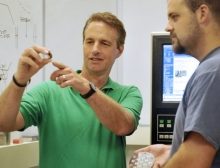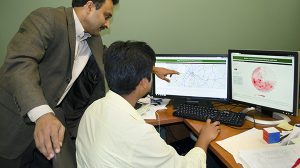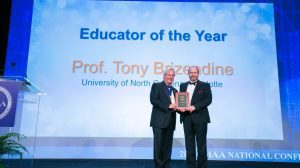News
SME has recognized Dr. John Ziegert of the Mechanical Engineering and Engineering Science Department with the 2017 SME Frederick W. Taylor Research Medal for his significant contributions to manufacturing science.

Dr. Matt Davies of Mechanical Engineering and Engineering Science is among the 2017 recipients of the UNC Board of Governors Award for Excellence in Teaching.
Congratulations to Yue Peng and Hossein Shahinian who won 1st and 3rd places respectively in the Computer Science/Math/Engineering Oral presentations last week at the Graduate and Professional Student Government’s 17th Annual Graduate Research Symposium.

Hundreds of civil engineering students from throughout the southeast had a great time over the weekend, as they competed against one another in multiple events at the annual American Society of Civil Engineers (ASCE) Carolinas Conference.

The Lee College of Engineering is excited to announce that Dr. Michael S. Mazzola will be the third director of the Energy Production and Infrastructure Center (EPIC).
The Lee College of Engineering’s NASA Astrobotics team has launched a crowdfunding effort to help pay its way to this year’s competition at Kennedy Space Center. The team of eight multidisciplinary engineering students will compete in the 2017 NASA Robotic Mining Competition.
Three engine engineers from Roush Yates Engines will talk about their careers in motorsports and their individual areas of specialty (valvetrains, cranktrain rotating assemblies, and electronic fuel injection (EFI) calibration).

Anthony L. “Tony” Brizendine of the UNC Charlotte William States Lee College of Engineering was recipient of the Construction Management Association of America (CMAA) 2016 National Educator of the Year Award.
Summer research apprenticeship opportunities for local students are available in Dr. Haitao Zhang’s group for summer 2017. One high school student and one undergraduate student will be supported by the High School and Undergraduate Research Apprenticeship Program (HSAP/URAP) funded by Army Research Office (ARO).
The National Ash Management Advisory Board (NAMAB) recognized members for distinguished service. Professor Susan Burns from Georgia Tech, Professor Lawrence Sutter from Michigan Tech and Professor Garrick Louis from the University of Virginia each received awards as they rotated into emeritus status.